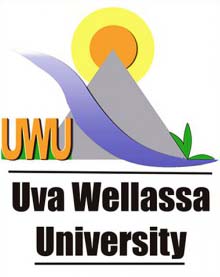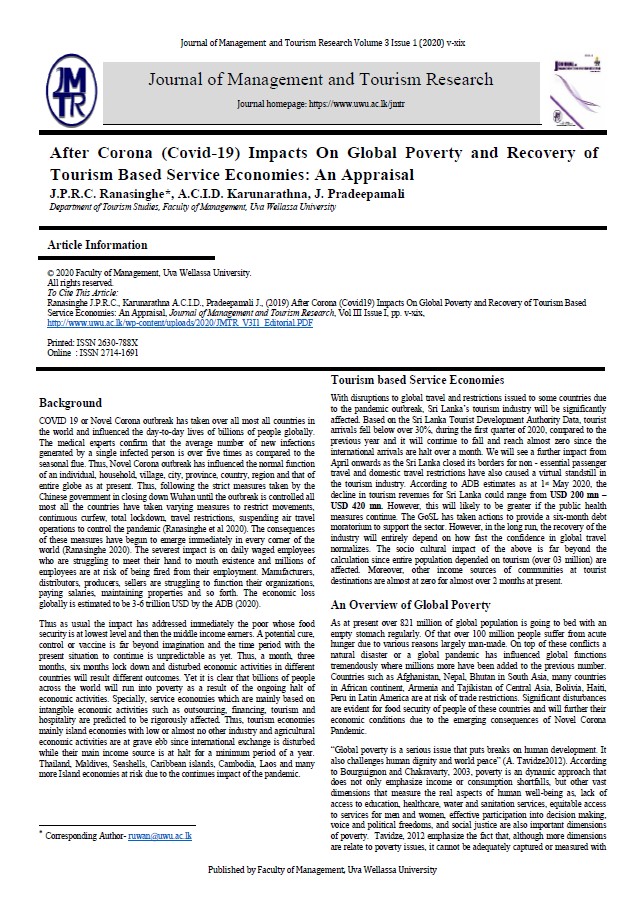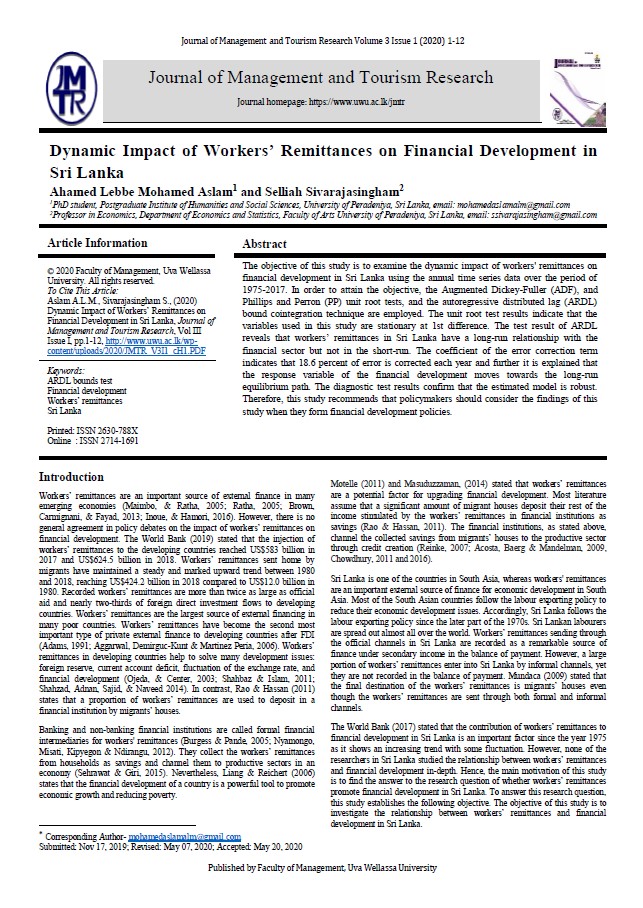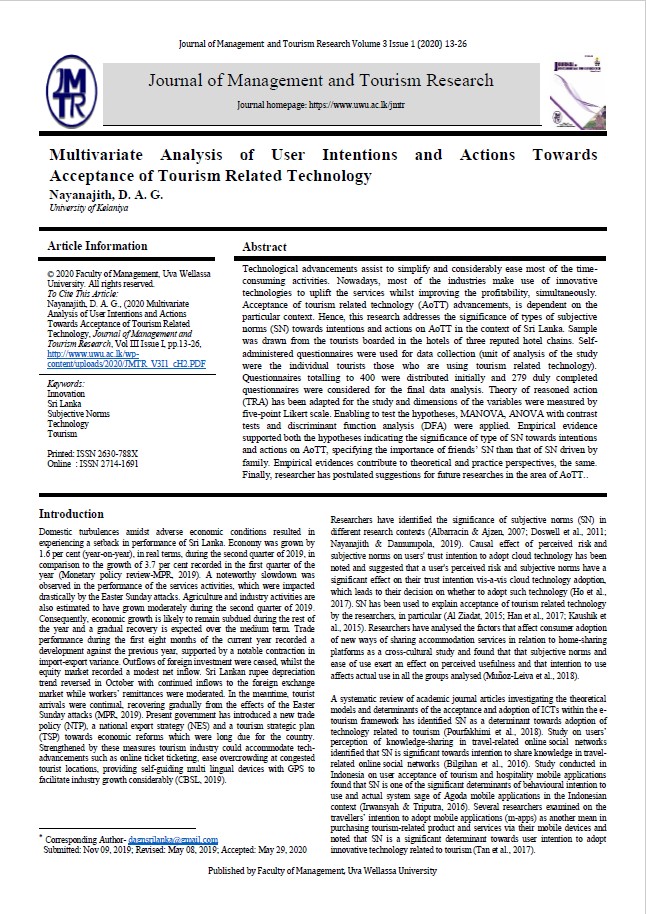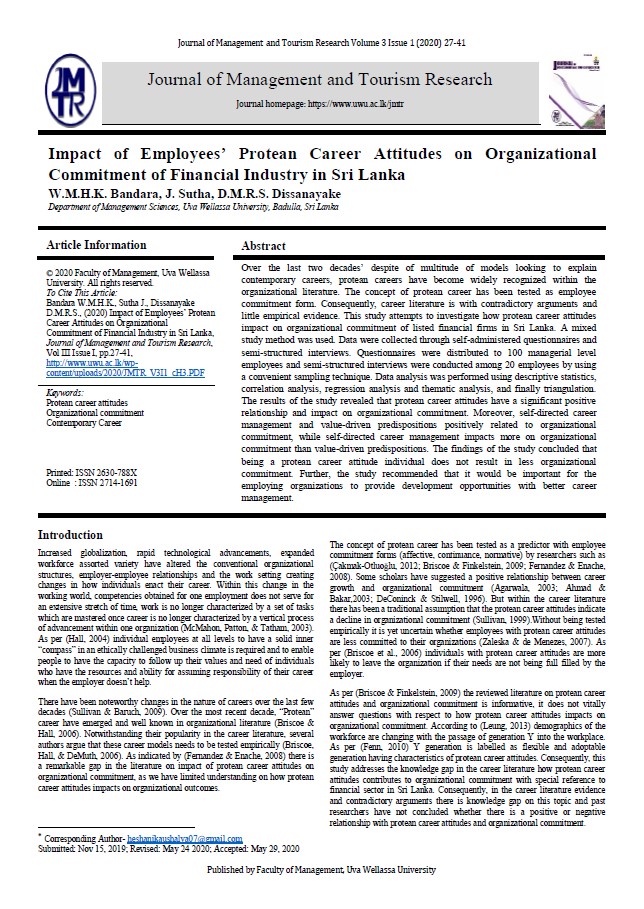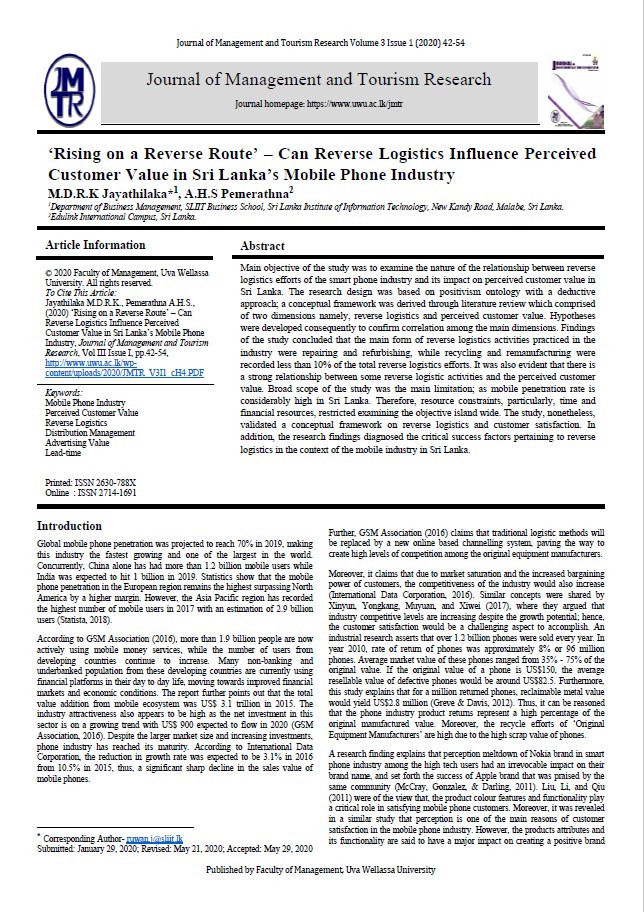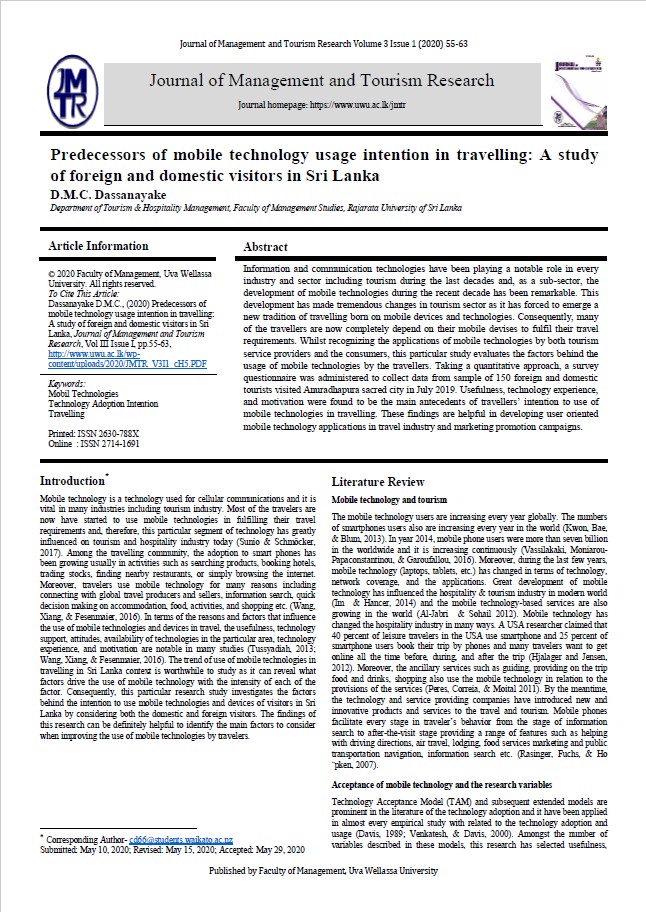Volume 03, Issue 01
TABLE OF CONTENTS
Editorial.After Corona (Covid-19) Impacts On Global Poverty and Recovery of Tourism Based Service Economies: An Appraisal
J.P.R.C. Ranasinghe*, A.C.I.D. Karunarathna, J. Pradeepamali
INFORMATION
Journal Title: Journal of Management and Tourism Research
Volume : 3 Issue : 1
Page : V – XIX
Correspondence : ruwan@uwu.ac.lk
01. Dynamic Impact of Workers’ Remittances on Financial Development in Sri Lanka
Ahamed Lebbe Mohamed Aslam1 and Selliah Sivarajasingham2
INFORMATION
Journal Title: Journal of Management and Tourism Research
Volume : 3 Issue : 1
Page : 1-12
Submitted: Nov 17, 2019; Revised: May 07, 2020; Accepted: May 20, 2020
Correspondence : mohamedaslamalm@gmail.com
ABSTRACT
The objective of this study is to examine the dynamic impact of workers’ remittances on financial development in Sri Lanka using the annual time series data over the period of 1975-2017. In order to attain the objective, the Augmented Dickey-Fuller (ADF), and Phillips and Perron (PP) unit root tests, and the autoregressive distributed lag (ARDL) bound cointegration technique are employed. The unit root test results indicate that the variables used in this study are stationary at 1st difference. The test result of ARDL reveals that workers’ remittances in Sri Lanka have a long-run relationship with the financial sector but not in the short-run. The coefficient of the error correction term indicates that 18.6 percent of error is corrected each year and further it is explained that the response variable of the financial development moves towards the long-run equilibrium path. The diagnostic test results confirm that the estimated model is robust. Therefore, this study recommends that policymakers should consider the findings of this study when they form financial development policies.
Keywords: ARDL bounds test, financial development, workers’ remittances, Sri Lanka.
02. Multivariate Analysis of User Intentions and Actions towards Acceptance of Tourism Related Technology
Nayanajith, D. A. G.
INFORMATION
Journal Title: Journal of Management and Tourism Research
Volume : 3
Issue : 1
Page : 13-26
Submitted: Nov 09, 2019; Revised: May 08, 2019; Accepted: May 29, 2020
Correspondence: dagnsrilanka@gmail.com
ABSTRACT
Technological advancements assist to simplify and considerably ease most of the time-consuming activities. Nowadays, most of the industries make use of innovative technologies to uplift the services whilst improving the profitability, simultaneously. Acceptance of tourism related technology (AoTT) advancements, is dependent on the particular context. Hence, this research addresses the significance of types of subjective norms (SN) towards intentions and actions on AoTT in the context of Sri Lanka. Sample was drawn from the tourists boarded in the hotels of three reputed hotel chains. Self-administered questionnaires were used for data collection (unit of analysis of the study were the individual tourists those who are using tourism related technology). Questionnaires totalling to 400 were distributed initially and 279 duly completed questionnaires were considered for the final data analysis. Theory of reasoned action (TRA) has been adapted for the study and dimensions of the variables were measured by five-point Likert scale. Enabling to test the hypotheses, MANOVA, ANOVA with contrast tests and discriminant function analysis (DFA) were applied. Empirical evidence supported both the hypotheses indicating the significance of type of SN towards intentions and actions on AoTT, specifying the importance of friends’ SN than that of SN driven by family. Empirical evidences contribute to theoretical and practice perspectives, the same. Finally, researcher has postulated suggestions for future researches in the area of AoTT.
Keywords: Innovation, Sri Lanka, Subjective Norms, Technology, Tourism
3. Impact of Employees’ Protean Career Attitudes on Organizational Commitment of Financial Industry in Sri Lanka
W.M.H.K. Bandara, J. Sutha, D.M.R.S. Dissanayake
INFORMATION
Journal Title: Journal of Management and Tourism Research
Volume : 3
Issue : 1
Page : 27-41
Submitted: Nov 15, 2019; Revised: May 24 2020 ; Accepted: May 29, 2020
Correspondence : heshanikaushalya07@gmail.com
ABSTRACT
Over the last two decades’ despite of multitude of models looking to explain contemporary careers, protean careers have become widely recognized within the organizational literature. The concept of protean career has been tested as employee commitment form. Consequently, career literature is with contradictory arguments and little empirical evidence. This study attempts to investigate how protean career attitudes impact on organizational commitment of listed financial firms in Sri Lanka. A mixed study method was used. Data were collected through self-administered questionnaires and semi-structured interviews. Questionnaires were distributed to 100 managerial level employees and semi-structured interviews were conducted among 20 employees by using a convenient sampling technique. Data analysis was performed using descriptive statistics, correlation analysis, regression analysis and thematic analysis, and finally triangulation. The results of the study revealed that protean career attitudes have a significant positive relationship and impact on organizational commitment. Moreover, self-directed career management and value-driven predispositions positively related to organizational commitment, while self-directed career management impacts more on organizational commitment than value-driven predispositions. The findings of the study concluded that being a protean career attitude individual does not result in less organizational commitment. Further, the study recommended that it would be important for the employing organizations to provide development opportunities with better career management.
Keywords: Protean career attitudes, Organizational commitment, Contemporary career.
4. ‘Rising on a Reverse Route’ – Can Reverse Logistics Influence Perceived Customer Value in Sri Lanka’s Mobile Phone Industry
M.D.R.K Jayathilaka, A.H.S Pemerathna
INFORMATION
Journal Title: Journal of Management and Tourism Research
Volume : 3 Issue : 1
Page : 42-54
Submitted: January 29, 2020; Revised: May 21, 2020 ; Accepted: May 29, 2020
Correspondence : ruwan.j@sliit.lk
ABSTRACT
Main objective of the study was to examine the nature of the relationship between reverse logistics efforts of the smart phone industry and its impact on perceived customer value in Sri Lanka. The research design was based on positivism ontology with a deductive approach; a conceptual framework was derived through literature review which comprised of two dimensions namely, reverse logistics and perceived customer value. Hypotheses were developed consequently to confirm correlation among the main dimensions. Findings of the study concluded that the main form of reverse logistics activities practiced in the industry were repairing and refurbishing, while recycling and remanufacturing were recorded less than 10% of the total reverse logistics efforts. It was also evident that there is a strong relationship between some reverse logistic activities and the perceived customer value. Broad scope of the study was the main limitation; as mobile penetration rate is considerably high in Sri Lanka. Therefore, resource constraints, particularly, time and financial resources, restricted examining the objective island wide. The study, nonetheless, validated a conceptual framework on reverse logistics and customer satisfaction. In addition, the research findings diagnosed the critical success factors pertaining to reverse logistics in the context of the mobile industry in Sri Lanka.
Keywords: Mobile Phone Industry, Perceived Customer Value, Reverse Logistics, Distribution Management, Advertising Value, Lead-time
5. Predecessors of mobile technology usage intention in travelling: A study of foreign and domestic visitors in Sri Lanka
D.M.C. Dassanayake
INFORMATION
Journal Title: Journal of Management and Tourism Research
Volume : 3
Issue : 1
Page : 55-63
Submitted: May 10, 2020; Revised: May 15, 2020 ; Accepted: May 29, 2020
Correspondence : cd66@students.waikato.ac.nz
ABSTRACT
Information and communication technologies have been playing a notable role in every industry and sector including tourism during the last decades and, as a sub-sector, the development of mobile technologies during the recent decade has been remarkable. This development has made tremendous changes in tourism sector as it has forced to emerge a new tradition of travelling born on mobile devices and technologies. Consequently, many of the travelers are now completely depend on their mobile devises to fulfill their travel requirements. Whilst recognizing the applications of mobile technologies by both tourism service providers and the consumers, this particular study evaluates the factors behind the usage of mobile technologies by the travelers. Taking a quantitative approach, a survey questionnaire was administered to collect data from sample of 150 foreign and domestic tourists visited Anuradhapura sacred city in July 2019. Usefulness, technology experience, and motivation were found to be the main antecedents of travelers’ intention to use of mobile technologies in travelling. These findings are helpful in developing user oriented mobile technology applications in travel industry and marketing promotion campaigns.
Keywords: Mobil Technologies, Technology Adoption Intention, Travelling.

